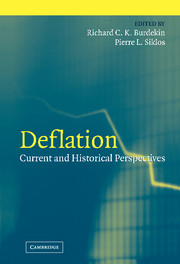Book contents
- Frontmatter
- Contents
- List of Tables and Figures
- List of Contributors
- Preface
- 1 Fears of Deflation and the Role of Monetary Policy: Some Lessons and an Overview
- PART ONE FEARS OF DEFLATION AND THE ROLE OF MONETARY POLICY
- PART TWO DEFLATION AND ASSET PRICES
- PART THREE INTERNATIONAL PERSPECTIVES ON DEFLATION
- PART FOUR STOCK MARKET ADJUSTMENTS TO DEFLATION
- References
- Index
- Titles in the series
1 - Fears of Deflation and the Role of Monetary Policy: Some Lessons and an Overview
Published online by Cambridge University Press: 15 December 2009
- Frontmatter
- Contents
- List of Tables and Figures
- List of Contributors
- Preface
- 1 Fears of Deflation and the Role of Monetary Policy: Some Lessons and an Overview
- PART ONE FEARS OF DEFLATION AND THE ROLE OF MONETARY POLICY
- PART TWO DEFLATION AND ASSET PRICES
- PART THREE INTERNATIONAL PERSPECTIVES ON DEFLATION
- PART FOUR STOCK MARKET ADJUSTMENTS TO DEFLATION
- References
- Index
- Titles in the series
Summary
INTRODUCTION
Episodes of sustained declines in consumer prices have been rare since the 1930s. Recently, however, in addition to Japan's well-known ongoing experience with deflation, persistently falling consumer prices have been seen in other countries, such as Argentina, China, Hong Kong, Singapore, and Taiwan. Indeed, international success in reducing inflation by the mid-1990s was quickly followed by fresh fears of deflation. Deflation may be “worse” than inflation because of firms confronting rising real wages should nominal wage rigidity prevail. In the United States, Federal Reserve Bank of Richmond President J. Alfred Broaddus, having cast more dissents than anyone else in favor of tighter monetary policy in Federal Open Market Committee (FOMC) meetings in the past decade, recently stated that it would be “ironic to have fought all this time to bring the inflation rate down … and then lose price stability on the down side” (see Ip 2002: p. A1). Meanwhile, the FOMC meeting of May 6, 2003, gave official notice of the Fed's concern that “the probability of an unwelcome substantial fall in inflation, though minor, exceeds that of a pickup in inflation from its already low level.” As Ip (2003: p. A1) points out, this represented “a profound shift from half a century of preoccupation with fighting inflation.”
In the euro area, deflation is a distinct possibility in some of the major economies, especially in Germany (International Monetary Fund 2003).
- Type
- Chapter
- Information
- DeflationCurrent and Historical Perspectives, pp. 1 - 28Publisher: Cambridge University PressPrint publication year: 2004
- 2
- Cited by

